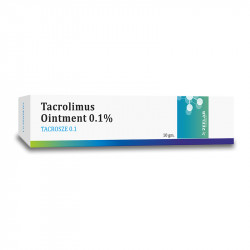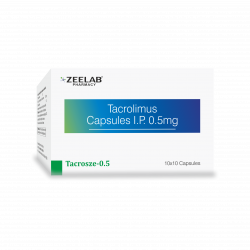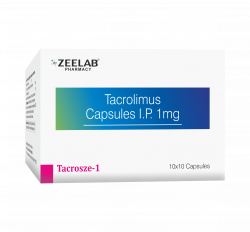Tacrolimus
Tacrolimus is an immunosuppressant medication used to prevent organ rejection in transplant patients and treat certain inflammatory skin conditions. It works by suppressing the immune system, reducing the risk of rejection in kidney, liver, or heart transplants. In topical form, it is used to treat eczema and other skin conditions that do not respond to steroids. Tacrolimus is available as oral capsules and topical ointments, prescribed based on medical needs.
Uses of Tacrolimus
- Prevention of organ rejection in transplant patients
- Treatment of atopic dermatitis (eczema)
- Management of autoimmune diseases
- Used in certain inflammatory skin disorders
How Tacrolimus Works
Tacrolimus works by inhibiting the activation of T-cells, which play a key role in immune responses. By suppressing these cells, it helps prevent organ rejection and reduces inflammation in skin conditions. It is commonly used in combination with other immunosuppressants.
Benefits of Tacrolimus
- Effectively prevents organ rejection
- Reduces the need for high-dose steroids
- Provides relief from eczema and skin inflammation
- Helps manage autoimmune conditions
How to Take Tacrolimus
Oral Tacrolimus should be taken as prescribed by a doctor, usually on an empty stomach or with a light meal. Topical Tacrolimus should be applied to affected areas twice daily. Dosage and duration depend on the medical condition being treated.
Types of Dosage Available
- Tacrolimus 0.03% and 0.1% ointment
- Tacrolimus 0.5 mg, 1 mg, and 5 mg capsules
Side Effects of Tacrolimus
- Nausea and vomiting
- Increased blood pressure
- Kidney problems
- Infections due to suppressed immunity
- Skin irritation (topical use)
Safety Advice
- Avoid excessive sun exposure when using topical Tacrolimus
- Regular blood tests are required for monitoring
- Not recommended for pregnant or breastfeeding women without medical advice
- Inform your doctor about any other medications being taken
Frequently Asked Questions
Q: What is Tacrolimus used for?
A: Tacrolimus is used to prevent organ rejection and treat eczema and autoimmune conditions.
Q: How long should I use Tacrolimus ointment?
A: It should be used as directed by a doctor, usually for a short period until symptoms improve.
Q: Can Tacrolimus cause kidney damage?
A: Long-term use of oral Tacrolimus may affect kidney function, requiring regular monitoring.
Q: Is Tacrolimus a steroid?
A: No, Tacrolimus is an immunosuppressant and does not contain steroids.
Q: Can I stop taking Tacrolimus suddenly?
A: No, stopping Tacrolimus abruptly may increase the risk of organ rejection or symptom recurrence.
Download India's most affordable pharmacy app
- Compare with medicine prices
- Save upto 90% on your medicine bills

Temperature Controlled storage and delivery

Regular Sanitization

Disinfected Packaging

















 Added!
Added!